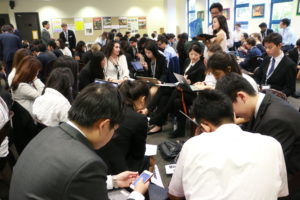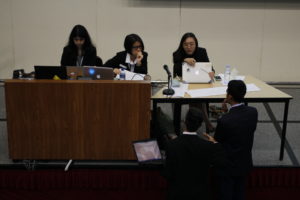 With THIMUN Hague and THIMUN Qatar just around the corner, this article will discuss one, if not the most, important part of the THIMUN experience– lobbying! Over the course of one week, delegates will have the opportunity to discuss global issues with other delegates in the committee room. Lobbying takes place during the first part of a THIMUN or THIMUN-affiliated conference, and the length depends on the length of the conference. Besides the actual debate on these issues, roughly half of the conference is dedicated to open discussion on these issues. On the first day, shortly after opening speeches, lobbying commences. During lobbying, delegates are split up into groups which are usually dictated by the committee topics. Delegates split into these groups based on their country/organization involvement on the issues, or which topic they have researched most heavily. If delegates are heavily involved or has heavily researched into more than one topic, there is freedom for delegates to walk around the room and switch over to groups throughout lobbying session. In these groups, the main goal is to draft a resolution to be debated during the conference. All topics are debated, and therefore at least one resolution should be produced for each topic (this is subject to change based on how many committee topics there are, or how much time is allocated per issue/per resolution).
With THIMUN Hague and THIMUN Qatar just around the corner, this article will discuss one, if not the most, important part of the THIMUN experience– lobbying! Over the course of one week, delegates will have the opportunity to discuss global issues with other delegates in the committee room. Lobbying takes place during the first part of a THIMUN or THIMUN-affiliated conference, and the length depends on the length of the conference. Besides the actual debate on these issues, roughly half of the conference is dedicated to open discussion on these issues. On the first day, shortly after opening speeches, lobbying commences. During lobbying, delegates are split up into groups which are usually dictated by the committee topics. Delegates split into these groups based on their country/organization involvement on the issues, or which topic they have researched most heavily. If delegates are heavily involved or has heavily researched into more than one topic, there is freedom for delegates to walk around the room and switch over to groups throughout lobbying session. In these groups, the main goal is to draft a resolution to be debated during the conference. All topics are debated, and therefore at least one resolution should be produced for each topic (this is subject to change based on how many committee topics there are, or how much time is allocated per issue/per resolution).
Prior to the conference, e
After groups have developed a rough draft resolution, Chairs look over it one last time before the draft resolution is submitted to the Approval Panel. The Approval Panel consists of directors that revise the draft resolutions for grammatical errors and resolution formatting. After a resolution has been revised, it is finalized and ready for debate!

A director in the Approval Panel assisting delegates before finalizing the resolution for debate.
As evident in this article, much weight is put on the success of lobbying– an experience exclusive to THIMUN and THIMUN-affiliated conferences! Without the careful revision and support of all individuals, there leaves risk for unproductive discussion during debate on the committee issues. This is why, during THIMUN Singapore XII, extended lobbying commenced for the first time for all General Assembly sub-committees. This opportunity gave participants more time to openly discuss and draft resolutions on the committee topics with other delegates, prior to actual debate.


